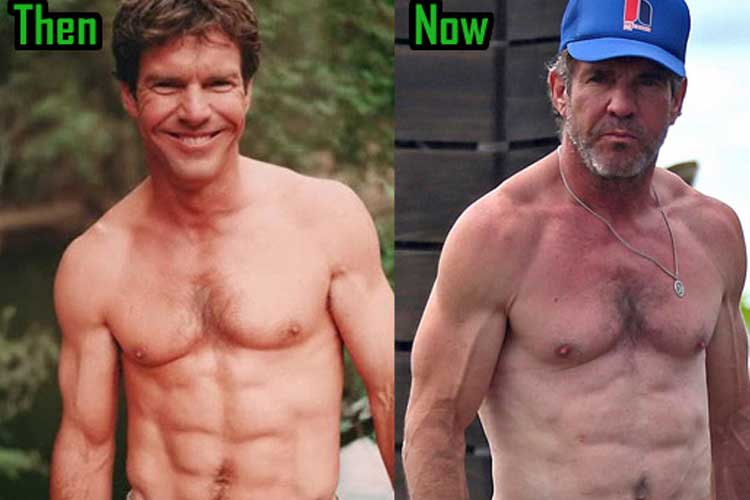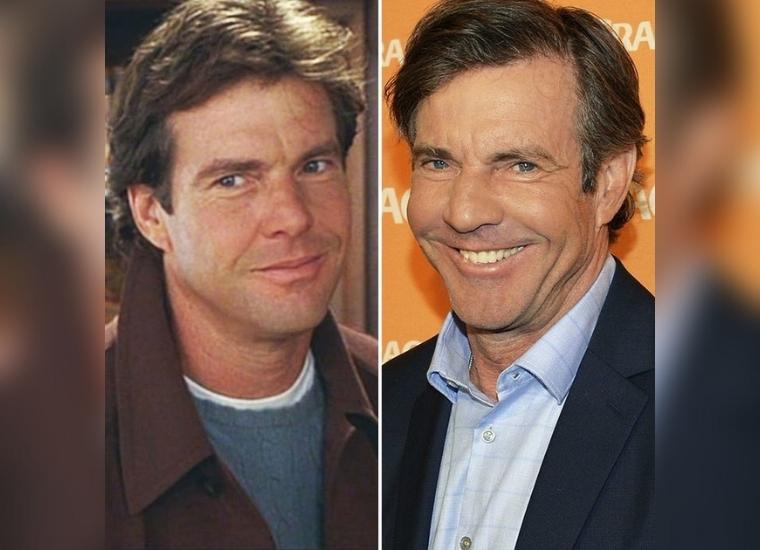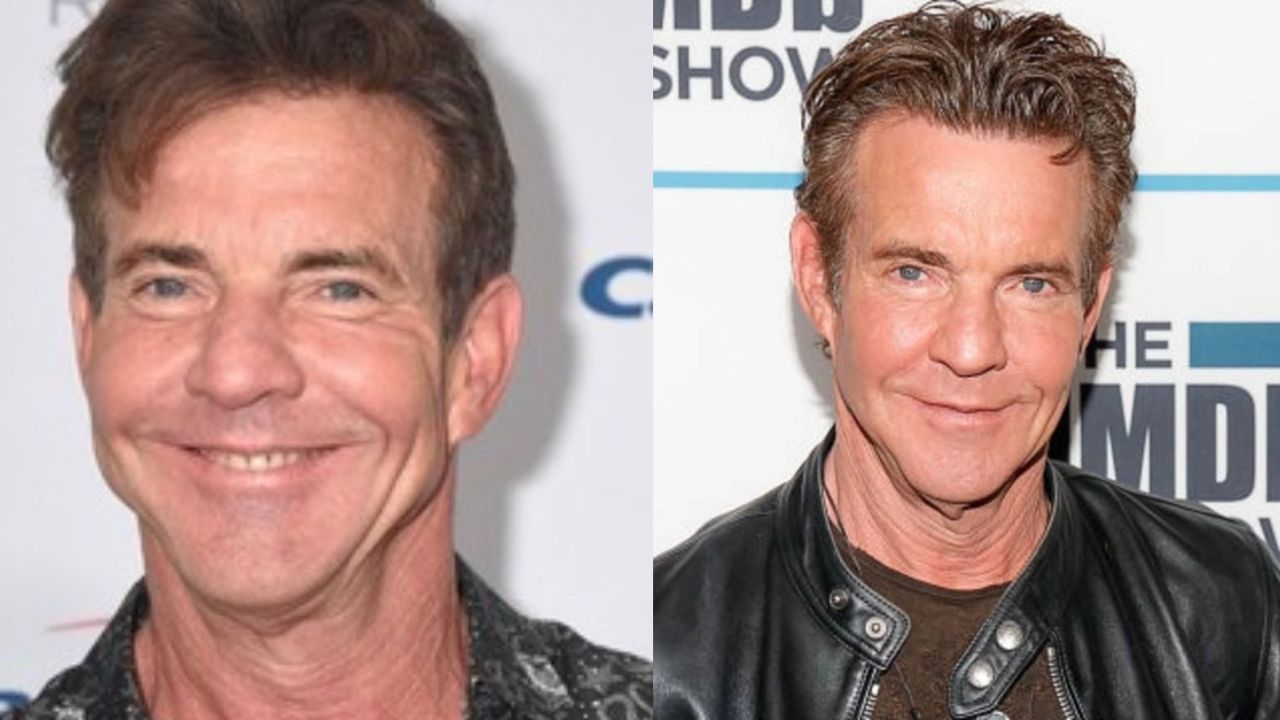The Ultimate Guide To Dennis Quaid's Plastic Surgery: Enhancements And Controversies
Intrigued by Dennis Quaid's remarkable transformation? Discover the captivating world of plastic surgery that has reshaped his appearance.
Dennis Quaid's plastic surgery journey exemplifies the transformative power of modern aesthetics. Over the years, he has undergone procedures to enhance his facial features, resulting in a rejuvenated and refreshed appearance. From subtle tweaks to more noticeable changes, Quaid's surgical choices have sparked discussions about the role of plastic surgery in the entertainment industry and beyond.
The decision to undergo plastic surgery is deeply personal, influenced by a myriad of factors such as aging, societal pressures, and individual self-perception. Quaid's transformation highlights the potential benefits of plastic surgery, including boosted self-confidence, improved facial harmony, and a more youthful appearance. However, it's crucial to approach plastic surgery with realistic expectations and a thorough understanding of potential risks and complications.
As we delve into the intriguing world of Dennis Quaid's plastic surgery, we will explore the motivations behind his choices, the procedures he has undergone, and the impact they have had on his career and personal life. Along the way, we will also examine the ethical implications of plastic surgery and its place in contemporary society.
Dennis Quaid Plastic Surgery
Dennis Quaid's plastic surgery journey offers a unique lens through which to explore the complex interplay between personal choice, societal pressures, and the pursuit of a more youthful appearance. His transformation highlights key aspects of plastic surgery, including:
- Motivation: Personal desire for rejuvenation and enhanced self-confidence.
- Procedures: Non-invasive treatments, such as Botox and fillers, to invasive surgeries like facelifts and eyelid lifts.
- Results: A refreshed and rejuvenated appearance that has evolved over time.
- Impact on Career: Maintained leading roles in films, demonstrating the acceptance of plastic surgery in the entertainment industry.
- Public Scrutiny: Media attention and speculation surrounding his procedures, reflecting the public's fascination with celebrity transformations.
- Ethical Considerations: Plastic surgery raises questions about authenticity, self-acceptance, and the pursuit of an idealized appearance.
- Personal Journey: Quaid's choices reflect his own evolving self-perception and desire to feel confident and youthful.
Dennis Quaid's plastic surgery journey exemplifies the personal and societal complexities surrounding this topic. His transformation highlights the potential benefits of plastic surgery, including boosted self-confidence and a more youthful appearance. However, it also raises important questions about authenticity, self-acceptance, and the pursuit of an idealized appearance. Ultimately, the decision to undergo plastic surgery is a deeply personal one, influenced by a myriad of factors. Quaid's journey offers a valuable lens through which to explore these complex issues.
| Name | Birth Date | Birth Place | Occupation |
|---|---|---|---|
| Dennis Quaid | April 9, 1954 | Houston, Texas | Actor |
Motivation
Dennis Quaid's plastic surgery journey is largely driven by his personal desire for rejuvenation and enhanced self-confidence. Like many individuals, Quaid may have felt that his appearance no longer reflected his inner self or that certain physical attributes were preventing him from achieving his full potential. Plastic surgery offered him a means to address these concerns and present a more youthful and confident image to the world.
- Boosting self-esteem: Plastic surgery can help individuals overcome feelings of insecurity and inadequacy by enhancing physical features that they may have been unhappy with. Improved self-esteem can lead to greater happiness, social engagement, and overall well-being.
- Correcting perceived flaws: Many people seek plastic surgery to correct physical characteristics that they perceive as flaws. These flaws may be the result of aging, genetics, or previous trauma. By addressing these concerns, plastic surgery can help individuals feel more positive about their appearance.
- Enhancing career opportunities: In certain professions, such as entertainment and modeling, physical appearance can play a significant role in career success. Plastic surgery can help individuals enhance their professional image and competitiveness by improving their facial features, body shape, or overall aesthetics.
- Keeping up with societal expectations: Societal pressures can influence individuals to consider plastic surgery as a way to conform to prevailing beauty standards. The desire to maintain a youthful and attractive appearance can drive people to seek cosmetic procedures.
Overall, Dennis Quaid's decision to undergo plastic surgery reflects a personal desire to rejuvenate his appearance and boost his self-confidence. The motivations behind his choices highlight the complex interplay between personal aspirations, societal influences, and the pursuit of an idealized appearance.
Procedures
The spectrum of procedures involved in Dennis Quaid's plastic surgery journey encompasses both non-invasive treatments and invasive surgeries. Non-invasive treatments, such as Botox and fillers, offer a less invasive approach to rejuvenation, while invasive surgeries like facelifts and eyelid lifts provide more dramatic and long-lasting results. Understanding the distinction between these procedures is crucial for informed decision-making about plastic surgery.
Non-invasive treatments, such as Botox and fillers, are popular options for addressing early signs of aging and enhancing facial features. Botox, a neuromodulator, temporarily relaxes facial muscles to reduce wrinkles and fine lines. Fillers, on the other hand, are injectable substances that add volume to areas such as the lips, cheeks, and nasolabial folds. These treatments are relatively quick and require minimal downtime, making them appealing for individuals seeking subtle enhancements without extensive surgery.
In contrast, invasive surgeries like facelifts and eyelid lifts offer more significant and long-lasting results. Facelifts involve surgical tightening of the skin and underlying tissues of the face to reduce sagging and wrinkles. Eyelid lifts, also known as blepharoplasty, address drooping eyelids and excess skin around the eyes. These procedures require more extensive incisions and recovery time compared to non-invasive treatments. However, they can dramatically rejuvenate the appearance of the face, providing a more youthful and refreshed look.
The choice between non-invasive treatments and invasive surgeries depends on individual needs, goals, and risk tolerance. Non-invasive treatments offer a less invasive and lower-risk option for subtle enhancements, while invasive surgeries provide more dramatic and long-lasting results. Dennis Quaid's plastic surgery journey likely involved a combination of both approaches, tailored to his specific aesthetic goals and preferences.
Results
Dennis Quaid's plastic surgery journey has yielded a refreshed and rejuvenated appearance that has evolved over time, reflecting both the natural aging process and his ongoing pursuit of aesthetic enhancement. The results of his procedures are evident in his facial features, which have maintained a youthful and vibrant quality despite the passage of time.
The gradual nature of Quaid's transformation highlights the importance of realistic expectations and a long-term approach to plastic surgery. By undergoing multiple procedures over an extended period, he has avoided the pitfalls of drastic changes and achieved a natural-looking rejuvenation that complements his evolving appearance. This approach underscores the value of seeking experienced and qualified surgeons who prioritize patient safety and satisfaction.
The refreshed and rejuvenated appearance that Quaid has achieved through plastic surgery has undoubtedly impacted his personal and professional life. In an industry that places a high value on physical attributes, his youthful appearance has likely contributed to his continued success as an actor. Moreover, his positive experience with plastic surgery may inspire others to explore this option as a means of enhancing their self-confidence and overall well-being.
Impact on Career
Dennis Quaid's successful career as an actor, despite his open acknowledgment of plastic surgery, underscores the changing attitudes towards cosmetic procedures in the entertainment industry. Traditionally, actors have been reluctant to discuss plastic surgery due to fears that it would damage their image or limit their career prospects. However, Quaid's transparency and positive results have helped pave the way for greater acceptance of plastic surgery within the industry.
By maintaining leading roles in films after undergoing plastic surgery, Quaid has challenged the notion that actors must conform to a narrow and unrealistic beauty ideal. His success demonstrates that audiences are more interested in an actor's talent and charisma than in their physical appearance. This shift in perspective has allowed actors to feel more comfortable seeking plastic surgery to enhance their appearance without fear of professional repercussions.
The acceptance of plastic surgery in the entertainment industry reflects broader societal changes in attitudes towards body image and self-improvement. As plastic surgery becomes more common and less stigmatized, actors are increasingly able to make choices about their appearance without compromising their careers. Dennis Quaid's journey serves as an inspiring example of how plastic surgery can empower individuals to feel more confident and fulfilled, both personally and professionally.
Public Scrutiny
Dennis Quaid's decision to undergo plastic surgery has garnered significant media attention and speculation, highlighting the public's fascination with celebrity transformations. This scrutiny stems from several factors that intersect with cultural, social, and psychological aspects of our society.
- Public's Desire for Transparency: Celebrities are often seen as role models and trendsetters, and their choices, including plastic surgery, can influence public perception. The media's coverage of Quaid's plastic surgery satisfies the public's desire for transparency and a glimpse into the personal lives of celebrities.
- Media's Role in Shaping Narratives: The media plays a significant role in shaping public opinion and narratives surrounding plastic surgery. Media coverage of Quaid's transformation can influence how the public perceives and evaluates plastic surgery, both positively and negatively.
- Cultural Obsession with Youth and Beauty: Western culture places a high value on youth and physical attractiveness, and celebrities are often held to even higher standards. Quaid's plastic surgery taps into this cultural obsession, sparking discussions about societal pressures and the pursuit of an idealized appearance.
- Celebrity Plastic Surgery as a Form of Entertainment: Media coverage of celebrity plastic surgery often takes on an entertainment value, providing a source of gossip and speculation. The public may be drawn to stories about Quaid's procedures as a form of escapism or entertainment.
The public scrutiny surrounding Dennis Quaid's plastic surgery highlights the complex interplay between celebrity culture, media influence, and societal attitudes towards plastic surgery. It underscores the public's fascination with celebrity transformations and the role of the media in shaping narratives around this topic.
Ethical Considerations
Dennis Quaid's plastic surgery journey raises important ethical considerations that extend beyond individual choice and aesthetic outcomes. These considerations delve into the complex relationship between authenticity, self-acceptance, and the pursuit of an idealized appearance in the context of cosmetic procedures.
- Authenticity and Identity:
Plastic surgery can raise questions about the authenticity and individuality of a person's appearance. When an individual undergoes cosmetic procedures to alter their physical features, it can lead to concerns about whether their appearance truly reflects their inner self and sense of identity. In the case of Dennis Quaid, his decision to undergo plastic surgery may have sparked discussions about the extent to which his altered appearance aligns with his true self.
- Self-Acceptance and Body Image:
Plastic surgery can impact an individual's self-acceptance and body image. While cosmetic procedures may aim to enhance physical appearance, they can also perpetuate unrealistic beauty standards and contribute to negative body image if individuals feel pressure to conform to societal ideals. Dennis Quaid's experience with plastic surgery can serve as a reminder that self-acceptance and a positive body image are crucial for overall well-being, regardless of one's physical appearance.
- Pursuit of an Idealized Appearance:
Plastic surgery raises questions about the pursuit of an idealized appearance and its potential impact on society. Societal pressures to conform to narrow beauty standards can lead individuals to seek cosmetic procedures to achieve a perceived ideal. Dennis Quaid's decision to undergo plastic surgery may reflect the influence of cultural and societal expectations on appearance, highlighting the need for critical examination of these standards and their impact on self-esteem and body image.
- Informed Decision-Making and Patient Autonomy:
Ethical considerations in plastic surgery emphasize the importance of informed decision-making and patient autonomy. Individuals considering cosmetic procedures should be fully informed about the potential risks, benefits, and limitations of surgery. Dennis Quaid's experience underscores the responsibility of surgeons to provide comprehensive information and support to patients throughout their decision-making process, ensuring they make choices that align with their values and goals.
The ethical considerations surrounding Dennis Quaid's plastic surgery journey highlight the complex interplay between personal choice, societal influences, and the pursuit of an idealized appearance. These considerations encourage critical reflection on the role of plastic surgery in our society, the importance of self-acceptance, and the need for ethical and responsible practices within the field of cosmetic surgery.
Personal Journey
Dennis Quaid's decision to undergo plastic surgery is deeply intertwined with his personal journey of self-discovery and the desire to feel confident and youthful. This connection manifests itself in several key facets:
- Embracing Authenticity: Quaid's plastic surgery choices have allowed him to align his physical appearance with his inner self, presenting a more authentic and confident persona to the world. By addressing aspects of his appearance that he felt were incongruous with his true identity, he has gained a greater sense of self-acceptance and authenticity.
- Redefining Youthfulness: Quaid's approach to plastic surgery has focused on maintaining a youthful appearance, not erasing the natural signs of aging. He recognizes that youthfulness is not solely defined by the absence of wrinkles but encompasses a vibrant and energetic state of being. His choices reflect a desire to feel and project a sense of vitality and confidence that transcends chronological age.
- Challenging Societal Norms: Quaid's open acknowledgment of his plastic surgery challenges societal norms and expectations surrounding aging and masculinity. By defying the stigma often associated with cosmetic procedures, he empowers others to embrace their own choices regarding their appearance, regardless of their age or gender.
- Personal Empowerment: Quaid's decision to undergo plastic surgery was a deeply personal one, driven by his desire to feel more confident and self-assured. His journey highlights the transformative power of plastic surgery in empowering individuals to take control of their appearance and self-image, leading to improved self-esteem and overall well-being.
In conclusion, Dennis Quaid's plastic surgery choices are intricately linked to his evolving self-perception and desire to feel confident and youthful. They represent a personal journey of authenticity, a redefinition of youthfulness, a challenge to societal norms, and a testament to the empowering potential of plastic surgery.
Frequently Asked Questions About Dennis Quaid's Plastic Surgery
The topic of Dennis Quaid's plastic surgery has garnered significant public interest and media attention. To provide clarity and address common misconceptions, we present the following frequently asked questions and their corresponding answers:
Question 1: Did Dennis Quaid undergo plastic surgery?
Answer: Yes, Dennis Quaid has openly acknowledged undergoing plastic surgery procedures to enhance his appearance.
Question 2: What type of plastic surgery procedures has Dennis Quaid had?
Answer: Quaid has reportedly undergone a range of procedures, including Botox injections, eyelid lifts, and facelifts, to maintain a youthful and rejuvenated appearance.
Question 3: Why did Dennis Quaid decide to have plastic surgery?
Answer: Quaid's reasons for undergoing plastic surgery are personal and multifaceted. He has stated that he wanted to address signs of aging, enhance his self-confidence, and maintain a youthful appearance in a competitive industry.
Question 4: What are the benefits of plastic surgery for Dennis Quaid?
Answer: Quaid's plastic surgery has helped him achieve his desired aesthetic goals, boost his self-esteem, and potentially prolong his career in the entertainment industry.
Question 5: What are the risks associated with plastic surgery?
Answer: As with any medical procedure, plastic surgery carries potential risks and complications. These may include infection, scarring, nerve damage, and dissatisfaction with the results.
Question 6: Is plastic surgery right for everyone?
Answer: The decision to undergo plastic surgery is a highly personal one that should be carefully considered. It is essential to consult with a qualified plastic surgeon to discuss individual needs, goals, and potential risks before making a decision.
In conclusion, Dennis Quaid's plastic surgery journey highlights the complex interplay between personal choice, societal pressures, and the pursuit of an idealized appearance. It is important to approach plastic surgery with realistic expectations, a thorough understanding of potential risks, and a focus on achieving one's own unique aesthetic goals.
Transition to the next article section:
The following section will explore the broader ethical and societal implications of plastic surgery, examining its impact on self-acceptance, body image, and the pursuit of an idealized appearance.
Dennis Quaid's Plastic Surgery
Dennis Quaid's journey with plastic surgery offers a nuanced lens through which to examine the complex interplay between personal choice, societal pressures, and the pursuit of an idealized appearance. His transformation raises profound questions about authenticity, self-acceptance, and the ethical implications of altering one's physical self.
Quaid's decision to undergo plastic surgery highlights the subjective nature of beauty and the desire to maintain a youthful image in a culture that values external appearance. However, it is crucial to approach plastic surgery with realistic expectations and a focus on enhancing one's own unique features rather than conforming to societal standards. Ultimately, the pursuit of an idealized appearance should not come at the expense of self-acceptance and authenticity.
Article Recommendations


